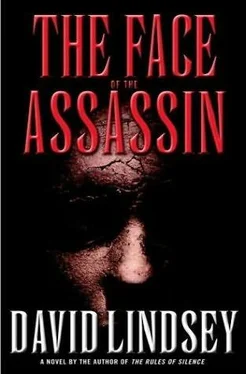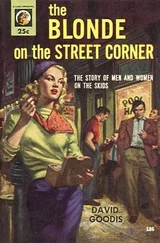David Lindsey - The Face of the Assassin
Здесь есть возможность читать онлайн «David Lindsey - The Face of the Assassin» весь текст электронной книги совершенно бесплатно (целиком полную версию без сокращений). В некоторых случаях можно слушать аудио, скачать через торрент в формате fb2 и присутствует краткое содержание. Жанр: Триллер, на английском языке. Описание произведения, (предисловие) а так же отзывы посетителей доступны на портале библиотеки ЛибКат.
- Название:The Face of the Assassin
- Автор:
- Жанр:
- Год:неизвестен
- ISBN:нет данных
- Рейтинг книги:4 / 5. Голосов: 1
-
Избранное:Добавить в избранное
- Отзывы:
-
Ваша оценка:
- 80
- 1
- 2
- 3
- 4
- 5
The Face of the Assassin: краткое содержание, описание и аннотация
Предлагаем к чтению аннотацию, описание, краткое содержание или предисловие (зависит от того, что написал сам автор книги «The Face of the Assassin»). Если вы не нашли необходимую информацию о книге — напишите в комментариях, мы постараемся отыскать её.
The Face of the Assassin — читать онлайн бесплатно полную книгу (весь текст) целиком
Ниже представлен текст книги, разбитый по страницам. Система сохранения места последней прочитанной страницы, позволяет с удобством читать онлайн бесплатно книгу «The Face of the Assassin», без необходимости каждый раз заново искать на чём Вы остановились. Поставьте закладку, и сможете в любой момент перейти на страницу, на которой закончили чтение.
Интервал:
Закладка:
Sabella glanced at his military watch. The gesture was fleeting-if Bern had blinked at that instant, he would have missed it.
“So, what do I fear if I live in a small town in Kansas? What do I need to be afraid of in Maryville, Ohio? Or in San Angelo, Texas? Or Tempe, Arizona? Terrorists? No, they want the Sears Tower. They want the White House. They want the Golden Gate Bridge. They want symbols. If it happens again, hell, they know they can watch it on television.
“What Baida saw, just one year later, was that America hadn’t really been terrorized at all,” Sabella continued. “Even the people in New York and Washington, D.C., were afraid only occasionally-when they saw something that reminded them of what had happened, when they recalled a sound, a smell, tasted a particular thing that brought it back again. But that was only an occasional thing. It didn’t preoccupy them anymore.”
Sabella paused and shook his head. “That’s not terror, Ghazi says. That is shock, a temporary thing. Terror is something altogether different. You do not have to recall terror, nor be reminded of it, because it never leaves you. It creates a perpetual foreboding, a constant dread, which suffocates your peace of mind.”
Sabella’s soft manner of speaking combined with his now-visible difficulty in containing his agitation presented an eerie, frightening context. It was discordant, like laughter at a funeral.
He reached out and put his coffee on the edge of the nightstand.
“Listen to me,” he said, his voice so soft that Bern found himself leaning forward on the bed and concentrating on Sabella’s mouth in order to decipher the words; “America will be in a hell of a lot of trouble when terrorists finally realize that the heartland is the ideal target. The captains of counterterrorism are watching the great American symbols that reside in the nation’s metropolitan centers. That’s where your government has put its funding. But security in the heartland? Nonexistent. Office buildings in Des Moines? No security. The crowded stadium at a regional football playoff in Oklahoma City? No security. A statewide basketball tournament in Indianapolis? Nothing. A school, a restaurant, a movie theater… in any heartland town?”
Suddenly, the small room seemed claustrophobically intimate to Bern. The fog outside was so heavy now that it even dampened the sounds of the city. Calle Pasado seemed isolated, a foreign country all its own, a place far away, on the borders of the imagination.
Sabella stared stoically at Bern. “Who could be more deluded about their safety than heartlanders? When you really get down to it, their belief that they don’t have anything to fear, that something like that really can’t happen to them, is pathetic. And that makes them the perfect targets.”
Bern was horrified at the implications of Sabella’s monologue, and he was horrified that he had been placed in this position, with so little understanding of what he should do. It didn’t do him any good to imagine what Jude would do. This was way beyond that kind of simple role-playing. And it was far too important to be left to the inexplicable currents of intuition.
Bern put his own coffee beside Sabella’s on the nightstand and stood. He stepped to the windows and looked down at the pasteleria. Susana was sitting at a table with the bodyguard. They weren’t talking. She was staring out into the gray morning light through the plate-glass window of the shop.
He turned to Sabella.
“Explain it to me very simply,” he said. “Exactly. Precisely. No innuendo. No implications. I have to know exactly what you want and what you are offering in return.”
Sabella looked down at his hands. His fingers were interlocked, the thumb of his right hand kneading the base of the thumb of his left hand. It wasn’t much of a gesture, but Bern was stunned to see it. This was forbidden body language, a small but profound blunder, one that gave away Sabella’s state of mind. He was under some kind of crushing pressure.
He lifted his head and looked at Bern.
“You can get this to the right people?”
Bern’s heart pummeled away at his chest. This was wild. He had no authority to answer this. He had no way of knowing even if he should answer it. It was a wild, out-of-control feeling, a mad, plunging ride, where absolutely everything was at stake.
“Yes.”
Sabella nodded, regarding him. “I thought so.”
Without warning, rain started falling, a sudden deluge. Bern looked across the street. He could still see Susana’s dress through the smear of rain.
As he watched her, wishing desperately that he could see her face, he realized that he had just given away everything. Without any effort at all, Sabella had learned that Jude was connected to American intelligence. A warm, damp fear washed over him. He was suddenly nauseated, and he could almost feel the barrel against his temple. Slowly, he turned to Sabella.
But Sabella wasn’t holding a gun. With sagging shoulders, he sat gazing at Bern, his deeply wrinkled white shirt profusely stained with sweat. The sound of the rain almost drowned out his soft voice.
“Ghazi wants you to stage his assassination,” he said. “Then he wants you to prove to Mossad that he is dead. And prove it to all the others, too. Then he wants you to hide him somewhere and protect him.”
Bern saw him swallow.
“In exchange, he will give you everything: names, dates, relationships, strategies… a thousand reasons never to sleep again. He will take you into the wilderness of killing where we have lived together for so many years.”
Chapter 37
The case of a dozen items that left the burning warehouse in the industrial zone in the northern colonias of Mexico City was driven to Benito Juarez International Airport on the city’s east side. Within an hour the case was airborne, traveling on a mixed cargo commercial jet headed for Chihuahua City, the capital of one of Mexico’s northernmost states.
In Chihuahua City, it was off-loaded, along with several crates of brass, fiberglass, and plastic stamp plates used in the manufacture of thermostat components for refrigeration units in one of the scores of maquiladoras on the edge of the city. At the maquiladora, everything was loaded onto a warehouse dock. The raw materials used for the thermostat components were eventually taken into the warehouse to be distributed, while the box of counterfeit product waited alone at one end of the dock.
Within fifteen minutes, a panel truck pulled up to the dock. A man got out of the passenger side of the truck and loaded the box through the rear door, stacking it alongside twenty-three other boxes with identical markings. The truck drove away, and in another ten minutes its headlights picked up the highway sign the driver was looking for: Chihuahua State Highway 16. The truck turned and headed for the Mexican border town of Ojinaga, across the Rio Grande from Presidio, Texas.
The foreman on the loading dock at the Chihuahua City maquiladora pocketed five hundred U.S. dollars for ignoring the cardboard box on the side of his dock for fifteen minutes.
It was a three-hour drive through the dark Mexican desert to the Ojinaga border-crossing station, and the van arrived at the tollbooth at 6:30 A.M. The guards on the Mexican side were used to seeing the Rivera Materiales Refrigeracion van that came through the border station twice a week from the maquiladora in Chihuahua City, and they waved the van through.
On the U.S. side, it was another matter. One guard, a sour gringo who had the reputation of being one of the strictest inspectors at the station, was, in fact, on the smugglers’ payroll. He could be bought off on any particular shipment so long as the contraband wasn’t drugs. He wouldn’t do drugs because he never knew when a drug-sniffing dog would be brought to the station on a deliberately unscheduled visit.
Читать дальшеИнтервал:
Закладка:
Похожие книги на «The Face of the Assassin»
Представляем Вашему вниманию похожие книги на «The Face of the Assassin» списком для выбора. Мы отобрали схожую по названию и смыслу литературу в надежде предоставить читателям больше вариантов отыскать новые, интересные, ещё непрочитанные произведения.
Обсуждение, отзывы о книге «The Face of the Assassin» и просто собственные мнения читателей. Оставьте ваши комментарии, напишите, что Вы думаете о произведении, его смысле или главных героях. Укажите что конкретно понравилось, а что нет, и почему Вы так считаете.












